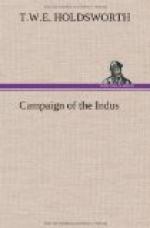We now returned by the ramparts, taking a great number of prisoners, and on reaching the large street where the horses were, the scene was perfectly ridiculous; the horses were loose, and running and charging about in all directions, kicking, fighting, &c. On getting near the gate we entered by, the effects of our fight became more apparent, as dying and dead Afghans testified. There were eight lying at one particular spot, where a tumbril had blown up, and their bodies were still burning from the effects. I never saw finer men than some of these Afghans—they were perfect models. The plunder now began, though to little purpose, as prize agents were at the gates and made most of us refund. I managed, however, to get through a rather handsome spear, which I took from before the tent of one of the chiefs. If the carelessness of my servants will allow it I mean to keep it till we get back whenever that may be, and send it home by some trusty person, when perhaps you may think it worthy of a place among your curiosities at Brookhill. The 13th and 17th, however, had the best of it in the citadel, which was also the palace, and where all young Dost’s women were. I hear that the soldiers have possession of some very handsome articles which they boned there I believe. After this, young Dost, or, to give him his right name, Hyder Khan, was found in a large hole near the citadel, with about twenty followers; they had some work, however, in securing him. About this time I saw the Shah, with the diplomatic people, Sir J. Keane, and Sir W. Cotton, enter the fort and proceed to the citadel. The old Shah was mightily delighted, as well he might be, and expressed himself in raptures with the European soldiery. I was back again to breakfast at mess by eight o’clock. Several of our men were wounded by arrows. One soldier swore “that a fellow had shot his ramrod into him.” Stisted had an arrow through the calf of his leg, but his wound is not considered of any importance.




